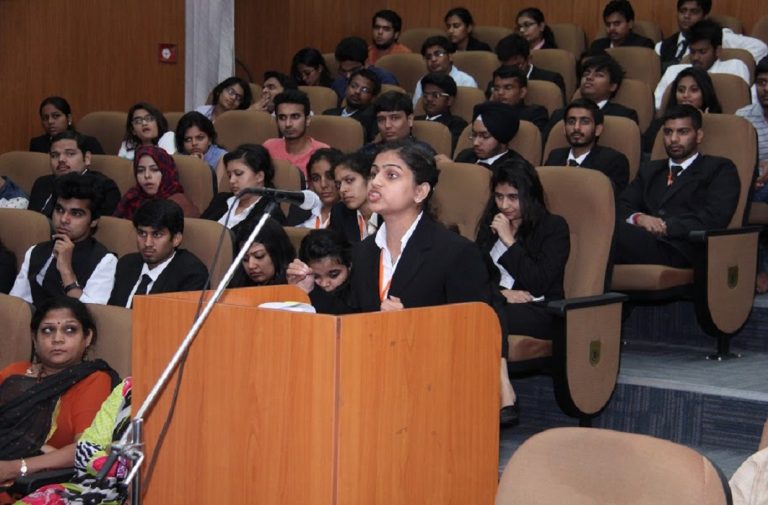
Above: A moot court session at GGSIPU. It had challenged the High Court order in the SC
The Supreme Court has reversed a Delhi High Court order barring Indraprastha University from conducting admissions to law courses on the basis of CLAT scores
By Vrinda Agarwal
In a recent order, the Supreme Court held that admissions to law courses in Guru Gobind Singh Indraprastha University (GGSIPU) for the academic year 2019-20 can take place only through the Common Law Admission Test (CLAT). By this order, the Court reversed a Delhi High Court decision whereby a circular issued by GGSIPU on February 26 was stayed. The circular had stated that admissions to law courses offered by the University and its affiliated institutes would take place through CLAT.
Through an interim ruling on April 1, the High Court had accepted the contention of the petitioner, the Self Financing Educational Institutions Association, that the February 26 circular contradicts the Delhi Professional Colleges or Institutions (Prohibitions of Capitation Fee, Regulation of Admission, Fixation of Non-Exploitative Fee and Other Measures to Ensure Equity and Excellence) Act, 2007. This Association comprises 12 private colleges affiliated to GGSIPU which offer LLB courses. The High Court had also mandated the Delhi-based varsity to conduct the Common Entrance Test (CET) for admission to its law courses, as has been the practice till date.
GGSIPU had challenged this decision by filing an appeal before the Supreme Court. In its petition, the University submitted that “the students would suffer irreparable loss and injury if the order passed by the Honourable High Court is not stayed, whereas no prejudice would be caused to the respondents nor they suffer in any manner whatsoever due to the stay as prayed for”. The matter was heard by a vacation bench comprising Justices Arun Mishra and MR Shah on May 21.
Even though the respondent, the Association, argued that students would suffer if admissions to law courses were made only through CLAT as the last date for applying for it was over, the bench ruled in favour of GGSIPU. The judges rebutted the respondent’s contention, saying: “Your apprehension does not appear to be right. The students are much smarter these days, and they would have applied for CLAT…Nobody will suffer. CLAT means CLAT…They (University) took permission from the government and it was permitted to admit students on the basis of CLAT.”
On February 11, the Delhi government’s Directorate of Higher Education had issued an order allowing GGSIPU to adopt national-level tests for admission to several courses, including LLB and LLM courses for 2019-20. Soon after, on February 26, the University had issued a circular announcing that CLAT-UG and CLAT-PG scores will form the basis for admission of students in the law programmes for 2019-20.
This case brings into focus the barrage of controversies plaguing CLAT examinations, and consequently, admissions to law programmes in the country. The CLAT 2019 examination, which was held on May 26, appears to be no different. Introduced in 2008, when only seven national law universities accepted CLAT scores, the number of participating institutions has now grown to around 70, of which 21 are national law universities and the rest include government as well as private universities.
The results of CLAT 2019 are likely to be declared by June 10, after which online counselling will begin for all the participating universities, including GGSIPU. One hopes that the students will not have to suffer more confusion.

